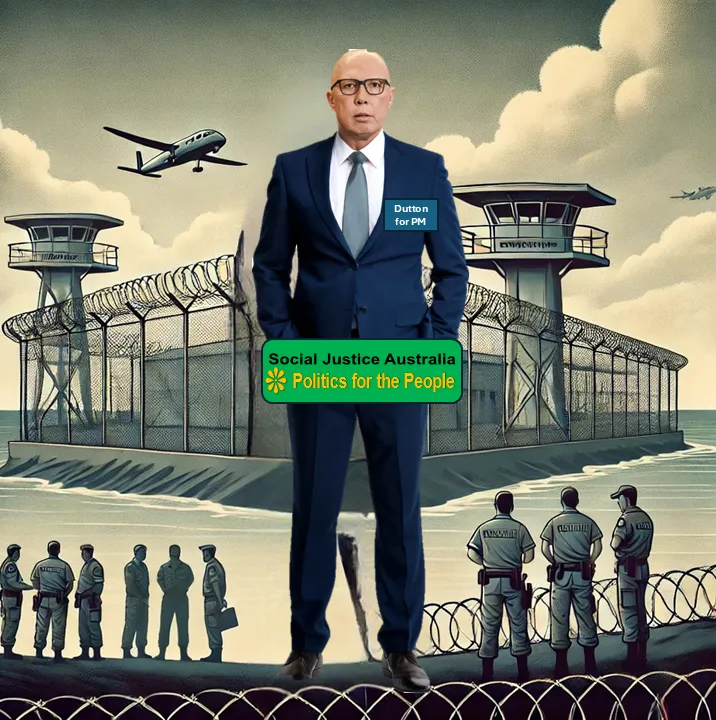Description
Peter Dutton’s Paladin scandal raises serious concerns about his leadership. Can Australia trust him as PM? Explore the facts.
Introduction
Imagine you are an asylum seeker fleeing danger, hoping for refuge. Instead, you end up in a detention centre managed by a company with a shady history, awarded government contracts without proper transparency. This is the story of Paladin, a security firm at the heart of a multimillion-dollar controversy that directly implicates Peter Dutton’s leadership.
Australia’s current Leader of the Opposition and former Home Affairs Minister, Dutton, has long been a divisive figure. His leadership raises fundamental questions about governance, transparency, and ethics. As the next federal election looms, Australians must ask: Is Peter Dutton fit to be Prime Minister?
The Paladin Controversy
What is Paladin?
Paladin Group was awarded $423 million in government contracts to provide security services for offshore detention centres on Manus Island. This deal, however, was fraught with red flags:
• The company’s registered address was a shack on Kangaroo Island.
• It received contracts through a limited tender process, bypassing open competition.
• Critics raised concerns about the company’s operational credibility and financial transparency.
The Lack of Transparency in Government Contracts
The Paladin deal exposed serious governance issues within Australia’s Home Affairs Department:
• No Competitive Tender: The contract was awarded in secrecy, raising questions about potential favouritism.
• Dubious Financial Practices: Reports showed massive payments for subpar services.
• Ethical Concerns: Offshore detention centres have long been criticised for human rights abuses.
Despite these controversies, the federal government, under Dutton’s leadership, continued to defend the contract.
Peter Dutton’s Role and Political Accountability
Was Dutton Personally Involved?
 While no direct evidence links Dutton to financial gains from Paladin, his leadership raises accountability concerns:
While no direct evidence links Dutton to financial gains from Paladin, his leadership raises accountability concerns:
• As Home Affairs Minister, Dutton oversaw the department that awarded the contracts.
• His lack of transparency has fuelled suspicions of insider dealings and cronyism.
• The government’s failure to conduct proper due diligence is still unexplained.
Offshore Detention and Human Rights Concerns
Dutton has long defended Australia’s offshore detention policies. However, under his watch:
• The High Court ruled indefinite detention unlawful, forcing the government to rethink its approach.
• Human rights groups condemned the government’s treatment of asylum seekers.
• Leaked reports detailed inhumane conditions within these detention centres.
This raises critical questions: Was the policy about national security, or was it a profit-making scheme at the expense of human lives?
Dutton’s Suitability for Prime Minister
Leadership Style and Political History
 Dutton’s track record suggests a leadership style that is:
Dutton’s track record suggests a leadership style that is:
• Authoritarian: He has a history of pushing hardline policies without public consultation.
• Secretive: His tenure in government has been marked by a lack of transparency.
• Divisive: His hardline stance on immigration has alienated large segments of the electorate.
Public Perception and Electability
Polling data suggests that Australians are still deeply divided on Dutton:
• His approval ratings consistently lag other political leaders.
• He has struggled to connect with moderate and progressive voters.
• His reputation as a hard-right conservative makes him a polarising figure.
What a Dutton-led Government Could Look Like
Based on his past policies, a Dutton-led government could:
• Double down on border security policies while ignoring human rights concerns.
• Further reduce government transparency, limiting public scrutiny of contracts.
• Push Australia towards a more authoritarian governance style, favouring corporate interests over public welfare.
Conclusion
Dutton’s leadership during the Paladin scandal raises serious concerns about his ability to govern ethically and transparently. With Australia’s future at stake, voters must ask: Can we trust Peter Dutton to lead the nation?
His track record suggests a leader prioritising secrecy over accountability, corporate interests over public welfare, and ideology over evidence-based policy. Australia deserves better.
Have Your Say
What do you think about Peter Dutton’s leadership? Should he be held accountable for the Paladin controversy? Share your thoughts in the comments below.
Q&A Section
Was Peter Dutton directly involved in Paladin’s contracts?
There is no direct evidence that Dutton personally received help from Paladin’s contracts. However, as Home Affairs Minister, he oversaw the department that awarded these contracts under questionable circumstances.
What was controversial about Paladin’s government contract?
Paladin was awarded over $423 million through a limited tender process, meaning it did not face open competition. Concerns included:
• The company’s dubious registration address (a shack on Kangaroo Island).
• Allegations of subpar services for asylum seekers.
• Lack of transparency in the contract award process.
How does this controversy affect Dutton’s suitability for PM?
Dutton’s involvement raises concerns about his governance, transparency, and ethical responsibility approach. If elected as Prime Minister, similar decision-making processes could lead to further governance scandals, reducing trust in Australia’s leadership.
Support Social Justice Australia
If you found this article insightful, explore more on political reform and Australia’s monetary sovereignty at Social Justice Australia. :https://socialjusticeaustralia.com.au/
Share this article with your community to help drive the conversation toward a more just and equal society.
Click on our “Reader Feedback”. Please let us know how our content has inspired you. Submit your testimonial and help shape the conversation today!
Additionally, leave a comment about this article below.
Support Social Justice Australia – Help Keep This Platform Running
Social Justice Australia is committed to delivering independent, in-depth analysis of critical issues affecting Australians. Unlike corporate-backed media, we rely on our readers to sustain this platform.
If you find value in our content, consider making a small donation to help cover the costs of hosting, maintenance, and continued research. No matter how small, every contribution makes a real difference in keeping this site accessible and ad-free.
💡 Your support helps:
✅ Keep this website running without corporate influence
✅ Fund research and publishing of articles that challenge the status quo
✅ Expand awareness of policies that affect everyday Australians
💰 A one-time or monthly donation ensures Social Justice Australia stays a strong, independent voice.
Thank you for being part of this movement for change. Your support is truly appreciated!


I have seen material that suggested that a certain Karen Dutton worked for Paladin at the time its contract was awarded. However, I have not been able to verify this, or find out if, and if so how, she may have been related to Dutton. Can any light be shed on this?
Hi Grant,
There have been claims that a person named Karen Dutton was employed by Paladin when it received significant contracts from the Australian government. However, no credible evidence confirms that Peter Dutton’s sister, Karen Dutton, worked for Paladin or was involved in awarding these contracts.
Discussions on platforms like Reddit have touched on this topic, but these are anecdotal and lack verification. It’s essential to approach such claims cautiously and rely on verified information when assessing potential conflicts of interest.
I think if Peter Dutton were to become Prime Minister, there would be a return to Authoritarian, divisive, secretive government.He has a proven track record.He is a Trump apologist.There would be a lack of transparency and an attack on minorities.And the possibility of more Human Rights abuses.
Hi Gerardine,
Thank you for your thoughtful comment. I share your concerns.
Peter Dutton’s track record as Home Affairs Minister reveals a pattern of authoritarian decision-making, limited transparency, and harsh policies—especially toward refugees, minorities, and civil liberties. His support for hard-right ideologies and alignment with figures like Trump signal a worrying direction for Australian democracy.
Many Australians rightly worry that a Dutton-led government could escalate surveillance, suppress dissent, and prioritise security rhetoric over human rights and social cohesion. His role in the Paladin scandal, where contracts worth hundreds of millions were awarded without open tender, is just one example of how public trust can be eroded under secretive governance.
We need leadership that protects all communities, values human dignity, and upholds democratic transparency. Our country’s future depends on it.
And as well the Pacific Seasonal Workers Scheme
$70,000,000 Million to run this Scheme.
This Worker Scheme is Racist to the core.
Workers come the Pacific to Australia on a Visa that no other workers come on Backpackers from all over the world can come to Australia and work on a different visa. This visa that the Pacific Seasonal Workers come in is a
INDENTURED VISA .
witch means they cannot work for no other Employer other than what is the name of who this Visa .
This visa has serious down falls ,to quote a couple are , wagers can be adjusted, meaning lower hourly rate , they can’t go to a better or fairer Employer , living deductions, lodgings , transport, airfares, on the job safety, hrs of employment just to list some.
This visa was introduced back in 1903 when the white Australia policy was to be introduced. Prior the Slave Trade of Melesian Men and Women who was tricked corhersed force , on to small ships and bought to QLD, some to NSW.
This was called.
BLACKBIRDING
STILL HAPPING TODAY.
Some call it Modern Slavery.
I believe more Blackbirbing.
You may ask about why I can talk about this matter. My wife is a second generation family descendents of this trade.
In a Senate enquiry headed up by Senator Sheldon, this matter was discussed.
Senator Matt Canavan asker a number of questions to myself and to other people on this enquire as well other Senator’s.
In summing up Canavan quote “this programme has a distinct look it is run by a CARTEL”.
PALIDIUM runs this programme worth $70,000,000 Million
Hi Geoffrey,
Thank you for this powerful and profoundly personal contribution. You’re right to draw attention to the disturbing parallels between the Pacific Australia Labour Mobility (PALM) Scheme and historical practices like blackbirding. Your wife’s descent from those affected by blackbirding adds an essential and often overlooked voice to this issue.
The use of restrictive, indentured-style visas, which lock Pacific workers into one employer, often under exploitative conditions, does echo Australia’s shameful past. When workers are unable to change employers, are subjected to arbitrary wage deductions, and live in isolated, controlled environments, we must question whether this is genuinely “labour mobility” or a new form of modern slavery.
As you noted, Palladium: https://ogi.thepalladiumgroup.com/2020/south-east-asia-pacific/ (not to be confused with Paladin) now manages this $70 million program. The fact that the Senate described such a scheme as resembling a “cartel” shows how urgently these programs need independent scrutiny.
We need national conversations that connect the dots between systemic exploitation, corporate profiteering, and government complicity. Your comment helps shine a spotlight on this injustice. These schemes should empower workers, not exploit them.
Would you be willing to share more of your story for an upcoming feature on Social Justice Australia?